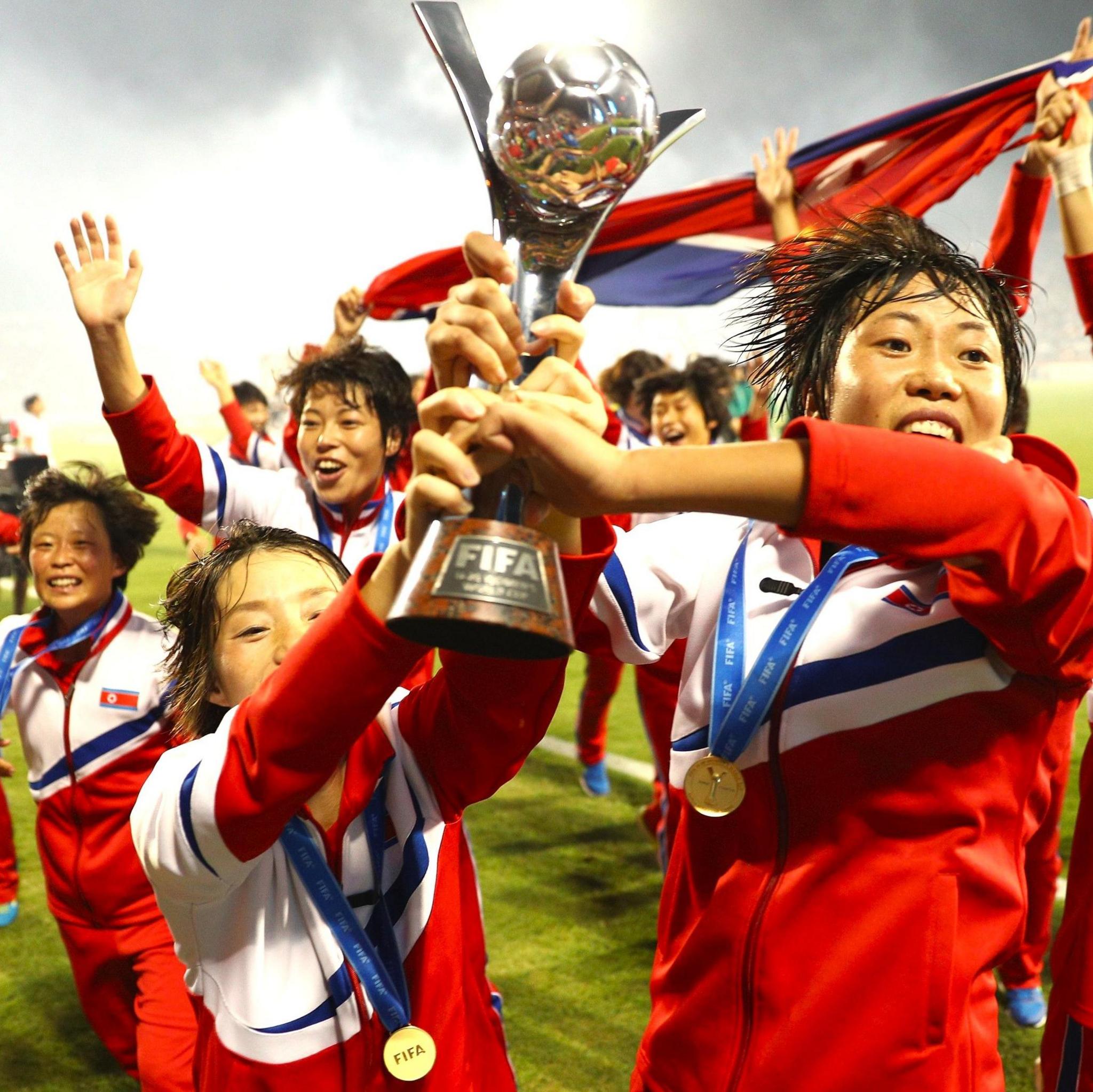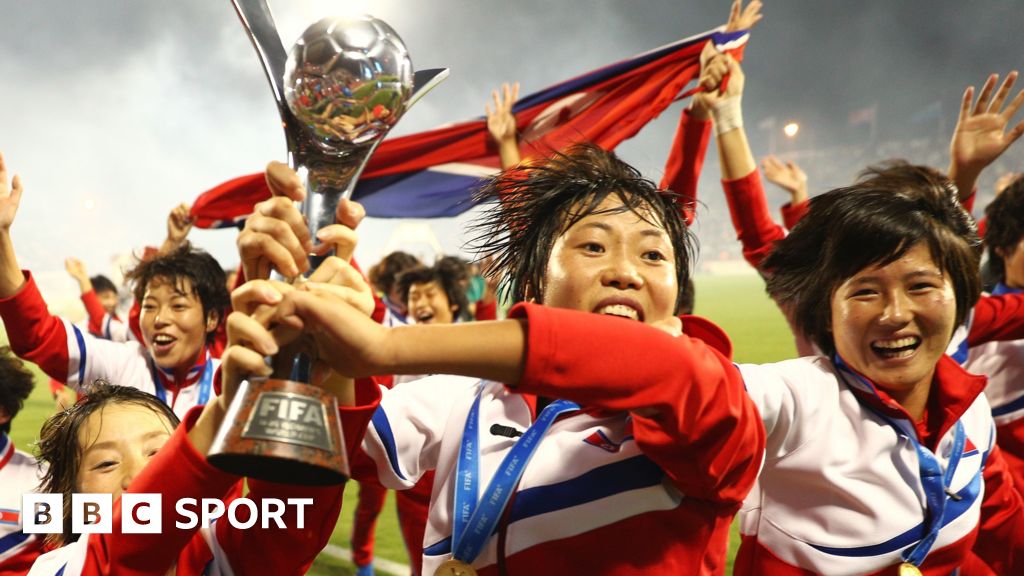
“Normally when there are 30 shots in the game, it is the United States with about 25 of ’em. Not today!”
It wasn’t just the ESPN commentator who was shocked.
Heather O’Reilly had scored the game’s final goal, dragging world number ones and two-time champions United States to a 2-2 draw in their opening match at the 2007 Women’s World Cup.
O’Reilly wasn’t surprised by the scoreline though. Or how evenly-fought the game was. She knew it would be tough.
Instead, as the final whistle blew, it was the attitude of the US’s opponents, who saw a chance missed, rather than a point gained, that struck her.
“I remember North Korea seeming disappointed,” says O’Reilly.
“Their body language seemed to say ‘oh my gosh, we were so close to taking down the giant’.”
North Korea is the world’s most isolated country, a state based around the infallibility of Supreme Leader Kim Jong-un and a deep suspicion of the outside world.
Yet, despite living standards being well behind most other nations, North Korea has been one of the strongest female football nations on the planet.
When they took on the United States in 2007, they were ranked fifth in the world and amid a run of three Asian titles in the space of a decade.
Their record at youth level is even better. In 2016, they won the U20 Women’s World Cup, defeating Spain, the United States and France in the knockout rounds. That same year, their under-17 team also lifted their age-grade World Cup.
“The game in 2007 was challenging, really super hard,” remembers O’Reilly of her meeting with North Korea’s senior side. “It was hard to get the ball off them, they were buzzing around, very quick.”
There was another challenge though, one that was unique to North Korea.
“It was just such a cloud of uncertainty,” says O’Reilly. “The film we had on them was very limited, even by the standard of the times.
“Every time we played North Korea, it was always a mystery.”
The mystery now is, after a doping controversy and a four-year absence from international football, can North Korea’s women be a force once again?
O’Reilly (left) competes for the ball during the United States’ 2-2 draw with North Korea at the 2007 Women’s World cup
O’Reilly and her United States team-mates may have lacked footage of North Korea. Brigitte Weich certainly doesn’t.
The Austrian filmmaker spent five years following the North Korean team, gaining unprecedented access to it’s inner workings and players for her 2009 documentary Hana, dul, sed., external
She says that, like with most things in North Korea, the country’s over-sized impact on the women’s game is attributed to the man at the very top.
“The players constantly said to us that the Dear Leader Kim Jong-il [Kim Jong-un’s predecessor] personally supported women’s football,” says Weich.
“Of course, they refer everything directly to the leader and nothing happens without him guiding, supporting or wanting it.
“But it is a very hierarchical and totalitarian dictatorship and I think that is kind of true.”
Weich (centre, in blue jacket) followed the North Korean team at the 2003 Asian Cup, the 2003 Women’s World Cup and the qualification tournament for the 2004 Olympics
Weich relays a theory that North Korea’s focus on women’s football sprung from a stage in Mexico in 1986.
At that year’s Fifa congress, Norwegian Ellen Wille, only 4ft 11in tall, stepped up to the lectern and started her speech – the first by a woman at a Fifa Congress – with a scream of anger., external
She was infuriated by the sidelining of the women’s game, which had been consigned to half a page in Fifa’s weighty annual report.
She demanded a World Cup for women. Fifa, shell-shocked, agreed. And, the theory goes, the North Korean delegates in the room returned to Pyongyang with a plan.
“Maybe someone came to Kim Jong-il and said to him that we could use this,” says Weich.
“North Korea is not the best in economics, science, human rights and the rest, but in countries like this they can be good at some sports because, from the top down, they can focus on training and nothing else.
“I don’t think it is a total myth that Kim Jong-il had an interest in women’s football, perhaps because he saw it as a chance to show up at a world level.”
North Korea celebrate a goal against Sweden at the 2007 Women’s World Cup
The plan was simple, sweeping and efficient. Formal football training at school from an early age, scouts sent out across the country, and, for the best, a central school of excellence and a raft of army teams allowing them to train and develop full-time at the state’s expense.
The material rewards for North Korea’s players aren’t big-money contracts or overseas moves. Instead relocation, rather than remuneration, is the lure.
For many in North Korea, life is unremittingly grim.
Shortages in food, healthcare and heating are common, particularly in rural areas.
A United Nations report in 2023 detailed the forced labour and sexual violence that is common in detention centres, which citizens can be transferred to for various crimes against the state.
Some of those who have escaped the country have recounted women prisoners undergoing forced abortions., external
Pyongyang presents differently. Living standards and leisure opportunities are better than in the provinces.
High-rise appartment blocks, a 150,000-capacity stadium, bowling alleys, department stores, a zoo, and a fairground are part of a faded Soviet-era cityscape of concrete monumentalism.
“It seems to be a privilege to live in Pyongyang and not in the countryside,” says Weich.
“The players received, as a gift from the leader, apartments in Pyongyang and could bring their parents to Pyongyang. Being picked for the team can be a career for a woman and her entire family – it can be life-changing.”
The Kim family dynasty has ruled the country since its founding 1948. Kim Jong-un, the grandson and son of Kim Il-sung and Kim Jong-il respectively, has been in power since 2011
In the 2000s, when England’s women would rarely attract crowds in five figures, North Korea were packing out the 50,000-capacity Kim Il-sung Stadium.
Whether or not all the spectators attended willingly – crowds of military personnel or whole factory workforces have been used as the backdrop to state occasions – the players are high-profile figures.
“They are stars,” says Weich. “Fans know them, recognise them and ask them for autographs.”
“There was even a soap opera based around the women’s football team, with fictional troubles – parents opposing them playing or forbidden love affairs and so on.”
Getting on the national team also means players can get out of the country. North Koreans are not allowed to travel abroad without permission from the state.
International tournaments and fixtures bring players into contact with realities unknown to many of their compatriots.
“The players I followed said ‘the Americans are much taller than us and much stronger than us, because they have enough food and all kinds of things we don’t have’ – but our minds are so strong, no-one expects that,'” remembers Weich.
“They all loved football, but the leader and the nation were big motivations.
“That is how they are brought up: the glory of the nation is everything and the individual is nothing.”
North Korea women warm up at the Kim Il-sung Stadium in Pyongyang before an 8-0 win over Taiwan in April 2007
At the 2007 Women’s World Cup, after drawing with O’Reilly’s United States, North Korea progressed from the group ahead of Sweden and Nigeria, before losing to eventual winners Germany in the quarter-finals.
“At that World Cup in 2007, we were staying at the same hotel as North Korea and I clearly remember having a moment when we were in the elevator with some of the North Korea players,” says O’Reilly.
“I remember thinking it would be cool to try to talk or play cards or anything to have some kind of cultural breakthrough.
“But it was definitely a fleeting thought because it didn’t appear that they wanted to engage much. Perhaps it was unfair of me to think, but there were not a tonne of smiles and eye contact being exchanged. They were all business in that elevator.
“But you have those thoughts about what is their training like, what is their preparation like, when did they get into the sport – I was always so curious about their backstories.”
Their 2011 campaign was notable for different reasons – North Korea’s women were caught up in football’s biggest doping scandal in a generation.
Five of their players tested for a rare kind of steroids. North Korea’s explanation was even rarer.
They said that the positive tests were caused by a traditional medicine made from the glands of a musk deer., external Officials explained it had been administered to the players after lightning struck their training ground back in North Korea.
Were North Korea’s players powered by something more than patriotic fervour, a systemic focus on the female game and a sweat-soaked training regime?
Five members of North Korea’s 2011 Women’s World Cup team tested positive for a rare kind of steroid, causing their expulsion from the next edition in 2015
A suspicious Fifa banned them from the 2015 World Cup. With their qualification seeding dented by their suspension, North Korea failed to make the 2019 tournament. They were then absent from the 2023 tournament as well, after North Korea withdrew from the international scene under some of the toughest Covid restrictions in the world.
Last autumn, on their return to action, North Korea won silver at the Asian Games. They narrowly missed out on a place at the Paris 2024 Olympics after a 2-1 aggregate defeat by Japan in a two-legged play-off in February.
No-one quite knows what sort of force the team will be able to muster in the future.
Can a wealth of youth talent translate into senior strength? Or will the development of the women’s game around the rest of the world, and North Korea’s isolation from it, leave them with too much to make up? How much have the pandemic border closures forced the authorities to refocus on more essential needs of its people, amid reports of starvation?
As with most things about North Korea, from the broadest intentions to the smallest detail, it is a mystery.
North Korea’s women’s team have featured in the regime’s domestic propaganda
Previously on Insight
-
-
Published9 July
-
-
-
Published4 July
-
-
-
Published2 July
-
-
-
Published28 June
-
-
-
Published26 June
-







